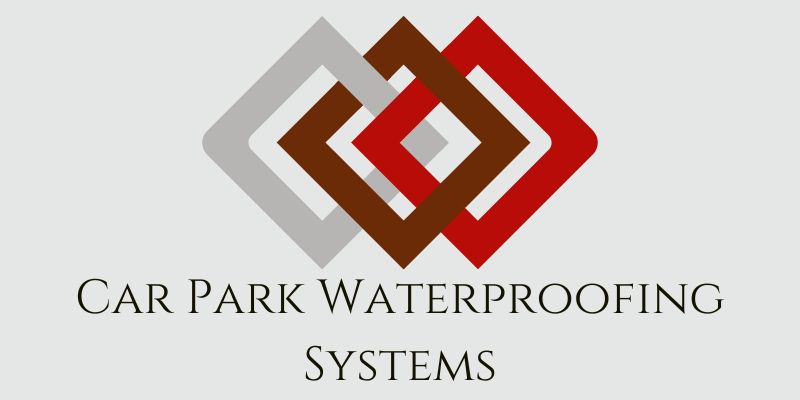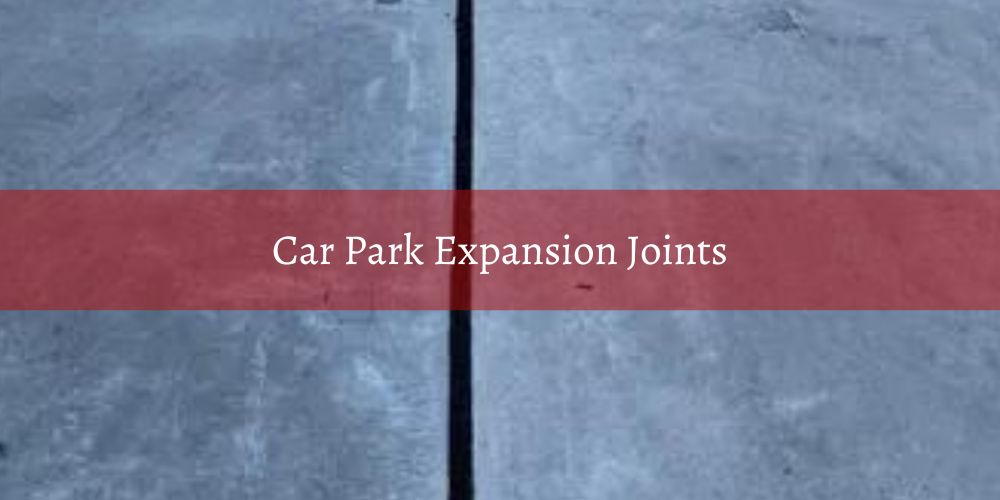Car park expansion joints are designed gaps in the construction of parking facilities which accommodate the movement of concrete slabs due to temperature changes, load stresses, and structural settling. These car park joints prevent cracking and other types structural damage by allowing the concrete to expand and contract safely. Expansion joints are normally filled with flexible materials such as rubber or silicone to maintain a watertight seal and ensure durability. The correct installation and maintenance of expansion joints is crucial for the longevity and integrity of parking structures. Expansion joints are often finished with joint covers. Joint covers are protective elements used to bridge the gap made by expansion joints. Joint covers are designed to provide extra protection, aesthetic integrations, safety and improve load distribution.
Car Park Waterproofing Systems provide professional installation and repair of car park expansion joints to ensure structural integrity and watertight performance. Expansion joints are essential in accommodating movement caused by temperature changes, traffic loads, and structural shifts. Our team supplies and installs a wide range of high-performance joint systems designed specifically for car parks, including elastomeric, nosing, and compression seal types. We ensure each joint is fully integrated with surrounding waterproofing and surfacing works, preventing water ingress and premature deterioration. Whether for new builds or refurbishment projects, Car Park Waterproofing Systems deliver reliable expansion joint solutions that maintain safety, durability, and long-term protection.
What Are Car Park Expansion Joints?
Car park expansion joints are gaps integrated into the construction of parking structures to allow for the natural movements of the building materials. These movements, caused by thermal expansion and contraction, seismic activity, or structural settling, can cause cracks and damage to the parking facility if not properly managed. Expansion joints are filled with flexible materials such as rubber, silicone, or specialised sealants. These materials create car park joints which allow the concrete or asphalt to expand and contract without causing damage to the structure. According to the American Concrete Institute, incorporating expansion joints can significantly extend the lifespan of a concrete structure by preventing stress-related damage.
These car park joints are critical for maintaining the structural integrity and safety of car parks. These movement joints are even more vital in regions with significant temperature fluctuations. Correctly installed expansion joints ensure the car park surface remains smooth and continuous. The reason why the surface needs to remain in this way is to prevent trip hazards and reduce long term maintenance costs. Joint covers can be used to help enhance safety and decrease the risks of car par users tripping. Movement joints also play a vital role in waterproofing by preventing water ingress through cracks. If water penetrates the car park's structure it can cause corrosion and other structural problems. Overall, expansion joints are essential parts of a car park and help preserve the functionality, safety, and longevity of the structure.
Have a question about an upcoming project?
What Are The Benefits Of Car Park Expansion Joints?
Car park expansion joints offer a number of benefits which are crucial for the long term durability and functionality of parking structures. The main benefit of car park movement joints is to protect the building's structural integrity by allowing it to cope with natural movements. Below we will look at all of the benefits of having expansion joints on parking structures.
- Promotes Structural Integrity
- Prevention of Cracks and Damage
- Enhanced Safety
- Waterproofing Protection
- Extended Lifespan
- Reduced Maintenance Costs
- Accommodates Thermal Expansion and Contraction
1. Promotes Structural Integrity
Car park expansion joints are imperative for maintaining the structural integrity of parking facilities. Movement joints allow the concrete or asphalt to expand and contract without causing stress or damage to the underlying structure. The Institute of Structural Engineers, state using expansion joints can greatly extend the lifespan of concrete structures by protecting against stress-related damage. In the UK, where weather conditions can vary greatly, these joints absorb the pressures of thermal movement and structural settling, helping maintain the overall stability and durability of the parking structure, ensuring it remains safe and functional over time. Thermal expansion can be severe in the UK. The reason for this is temperatures can vary greatly between seasons. Expansion joints reduce the effects of these temperature changes by providing the necessary flexibility in the concrete or asphalt. This extra flexibility in the concrete or asphalt surface helps prevent cracks and other types of damage which can compromise the car park's structural integrity. This is increasingly critical in multi-storey car parks where the structural demands are even greater than standard car parks.
2. Prevention of Cracks and Damage
Expansion joints prevent the formation of cracks and other types of damage which can occur when concrete or asphalt surfaces expand and contract. Without these joints, the natural movement of materials can lead to the car park suffering from significant structural issues. Issues which can occur when a car park has no movement joints include; cracks, spalling, and joint separation. The Concrete Society in the UK states the proper placement of expansion joints can reduce the occurrence of these issues by up to 75%. Cracks and spalling adversely effect the aesthetic appeal of car parks, create safety hazards and reduce the parking structure's lifespan. Using expansion joints to accommodate the natural movements of construction materials allows the car park to remain crack free and keep a smooth and stable surface. This preserves the overall health of the car park. Expansion joints also save costs as they prevent the need for costly concrete repairs, resurfacing and unnecessary car park closures.
3. Enhanced Safety
Properly installed expansion joints enhance the safety of car parks by maintaining a smooth and continuous surface. This reduces the risk of trip hazards and vehicle damage caused by uneven or cracked car park surfacing. The Health and Safety Executive (HSE) highlights, well-maintained surfaces are crucial for preventing accidents and injuries. Car park expansion joints help make sure the car park remains free of significant surface defects which could compromise the safety of both pedestrians and vehicles. Without expansion joints incorporated into the car park's design, uneven surfaces and cracks can appear which can cause trip-and-fall accidents and damage to vehicles. Vehicles are particularly prone to issues with their tyres and suspension systems when driving on uneven surfaces. For this reason car park operators should always incorporate expansion joints, as they allow for a safer environment for all users. The smooth, even surfaces which expansion joints create also contribute to a more pleasant driving and walking experience which further enhances overall user satisfaction and safety.
4. Waterproofing Protection
Car park expansion joints provide waterproofing protection by incorporating flexible sealants and waterproof membranes which accommodate structural movements. This combination of preventing water ingress by preventing surface cracks due to structural movement and maintaining a watertight seal, extends the lifespan and preserves the structural integrity of car parks . The BRE (Building Research Establishment) and CIRIA (Construction Industry Research and Information Association) both say movement joints are essential for preserving the structural integrity and longevity of car park structures. By preventing surface cracks from structural movement, car park expansion joints stop water from penetrating through to the underlying structure. These surface cracks are dangerous for two main reasons, they can cause damage to the concrete deck and corrosion of the reinforcement steel. This is highlighted by The International Concrete Repair Institute who note, waterproof expansion joints are absolutely essential for protecting against water ingress. In the UK, where rain and damp conditions are common, proper sealing of each expansion joint helps promote a car park which remains dry and structurally sound, even in the harshest of weather conditions. In summary, expansion joints support the overall waterproofing of the car park. This includes protecting the integrity of the concrete, reducing the risk of corrosion and extending the lifespan reinforcement steel.
5. Extended Lifespan
Expansion joints can greatly extend the lifespan of car parks, as they accommodate natural movements and prevent structural damage. Research published in the Journal of Performance of Constructed Facilities, states, structures with properly maintained expansion joints can have a service life 30-50% longer than those without. Car parks with a longer lifespan have less needs for disruptive repairs and renovations. This reduced maintenance burden provides long-term cost savings and ensures the car park has minimal downtime over it's service life. Expansion joints mitigate the effects of thermal expansion, contraction, and structural settling, which are common causes of stress and damage in parking structures. By allowing the concrete or asphalt to move freely without cracking or breaking, these joints help maintain the structural integrity of the car park, ensuring it remains functional and safe for a much longer period. The extended lifespan also means less frequent disruptions to the facility's operations due to major repair or renovation projects, thus maintaining consistent service for users.
6. Reduced Maintenance Costs
Incorporating expansion joints into car park design can lead to substantial cost savings on maintenance. As already mentioned, car park joints prevent cracks, spalling, and other forms of damage. A study by the National Institute of Standards and Technology (NIST) found preventive maintenance, including the use of expansion joints, can lower maintenance costs by up to 40%. This reduction in maintenance costs makes expansion joints a cost-effective solution for preserving the integrity and functionality of car parks. If a car park does not already have expansion joints it is cost effective to add them to the existing structure. The prevention of significant structural damage through the use of expansion joints means fewer maintenance works are required to address issues such as cracking, water infiltration, and corrosion. This not only reduces direct repair costs but also minimises the indirect costs of the parking facility being shut.
7. Accommodates Thermal Expansion and Contraction
Expansion joints are specifically designed to accommodate the thermal expansion and contraction of construction materials. According to the Portland Cement Association, concrete and asphalt can expand and contract by as much as 0.5% of their length due to temperature changes. Without expansion joints in place, this thermal movement can cause significant stress and damage to the underlying structure. Car park joints are made from materials which allow for this natural movement. Therefore, the ability of a car park expansion joint to move with these expansions and contractions enable the car park to remain stable and intact. In the UK the use of joints in car parks is critical due to temperatures fluctuating widely between seasons. The result of using expansion joints is the car park surfacing remaining smooth and continuous, without the cracks and deformations which can arise from thermal stress. By preventing such damage, expansion joints contribute to the long-term durability and usability of car park facilities, ensuring it remains safe and functional under varying temperature conditions.
What Are The Different Types Of Car Park Expansion Joints?
There are a number of different types of expansion joints, each of which provide varying levels of movement, waterproofing protection, and durability. Each different type of expansion joint provides unique benefits. This makes the choice of expansion joint used important as the best solution will be different depending upon the car park's circumstances. The different types of car park expansion joints are:
- Compression Seals
- Elastomeric Joints
- Metallic Joints
- Modular Expansion Joints
- Strip Seal Joints
- Sliding Plate Joints
- Inflatable Seal Joints
Need details on car park expansion joints or a quote for your project? Click the button below to contact our experienced team who are ready to help you with your expansion joint needs.


